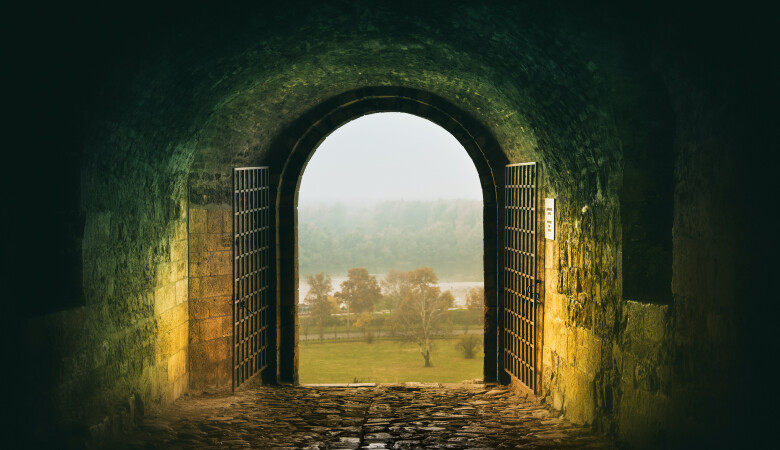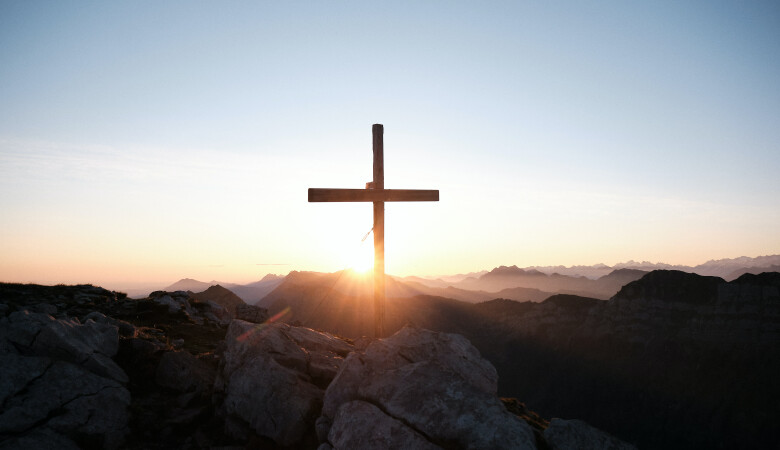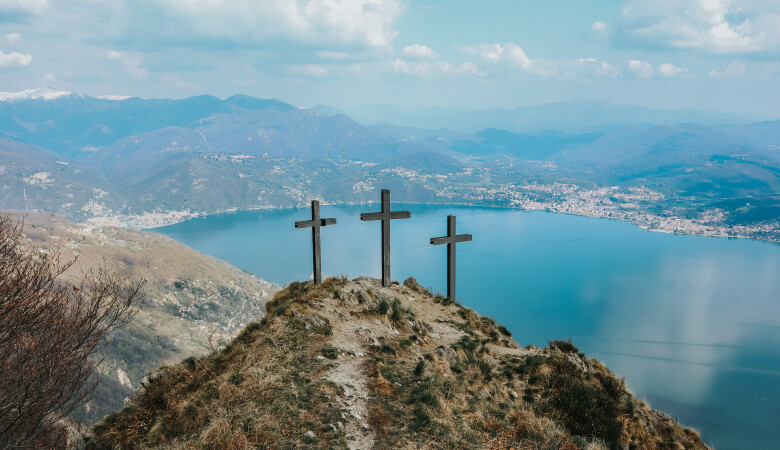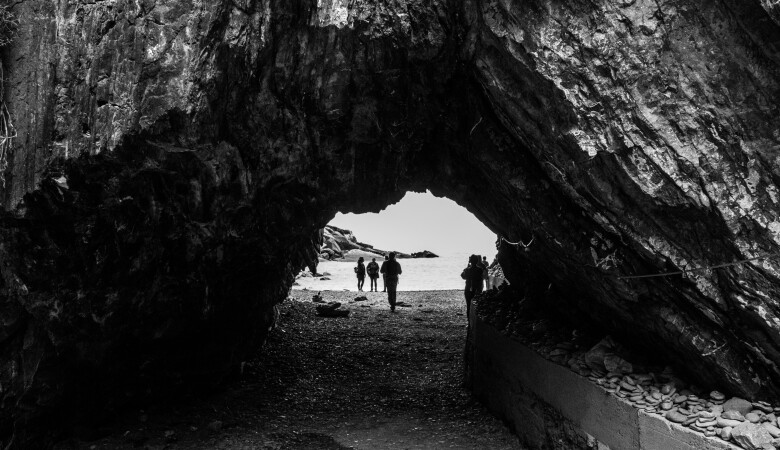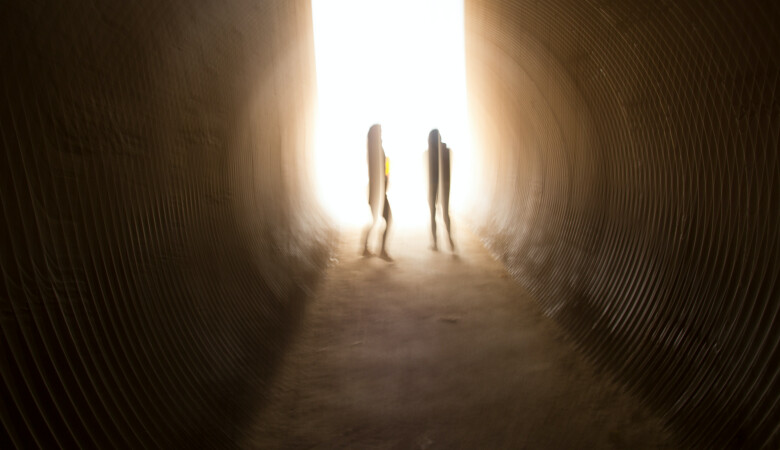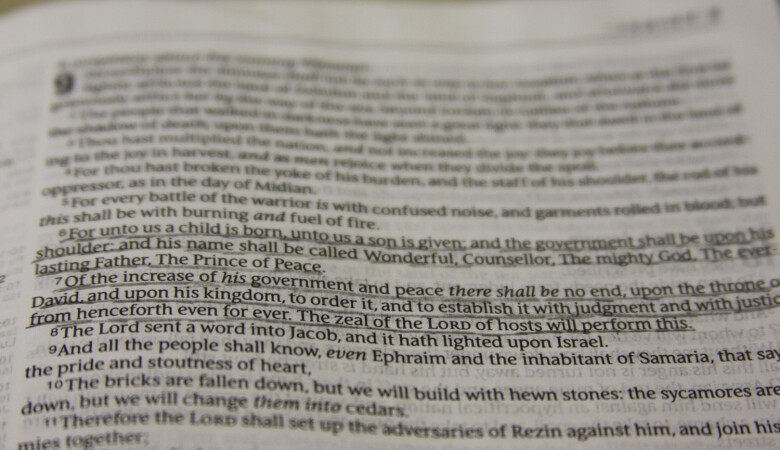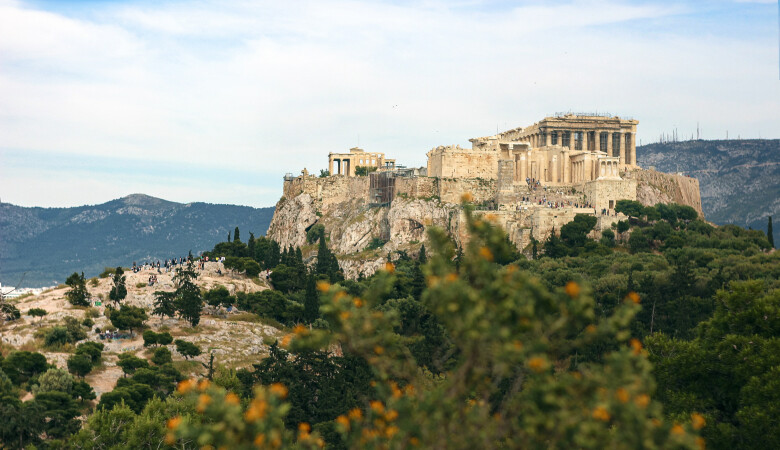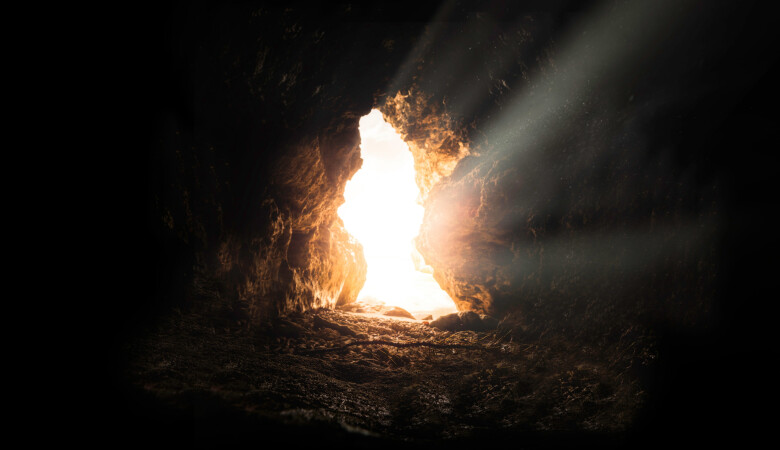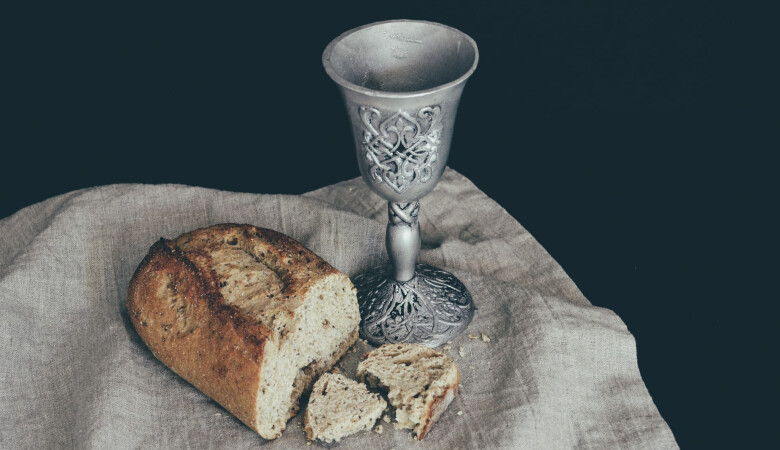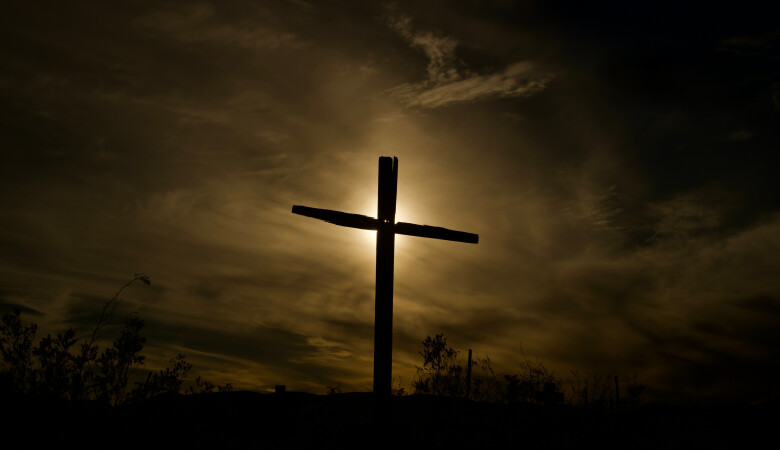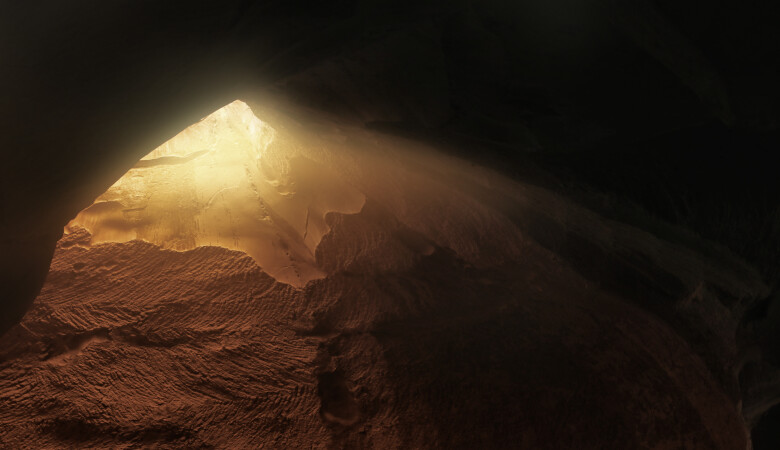Series: Easter Sermons
My Lord and My God
April 12, 2020 | Andy Davis
John 20:19-31
Resurrection
Andy Davis preaches a verse-by-verse expository sermon on John 20:19-31. The main subject of the sermon is how Jesus is recognized as God by His disciples.
- SERMON TRANSCRIPT -
What a joy it is to celebrate the resurrection of Jesus Christ, and we're going to zero in this morning on John Chapter 20 and Thomas' confession,” My Lord and my God!” What an incredible confession that is. And my mind this morning goes back to 25 years ago when I was a missionary with my wife, my children. We were in Japan and we had the privilege of celebrating the resurrection of Jesus at a sunrise service on a mountain in Japan. And I think about that they call themselves the Land of the Rising Sun. And it's where every day begins, worldwide really in terms of a massive population center. And yet, for all of that, for the over 125 to 150 million Japanese, less than 2% evangelical. And so it's such a joy and a privilege to assemble together there in Tokushima and be able to worship with Christian brothers and sisters there. And my mind's eye goes to that around the world, indeed, every year, I think about that and how the Gospel has made its rounds from Jerusalem through Judea, Samaria, even to the ends of the earth, there are brothers and sisters. And I, we, never can see them, but we imagine them in our minds eye we see the fellowship that we have. And we look ahead to our heavenly fellowship as well when we will be assembled with a multitude greater than anyone can count, from every tribe, language, people, and nation.
But as I think about that mountain top experience that I had, we really come this morning, in John Chapter 20 to the pinnacle, the summit, the mountain top of the indeed, the purpose of Scripture. And that is the confession that Thomas makes,” My Lord and My God!” Perhaps you have been to some incredible mountain tops and seen scenic vistas. Maybe you've been able to travel out west and seen the great Rocky Mountains, or the Grand Tetons. And how beautiful they are and you can picture in your mind's eye what you saw from that elevation. Or maybe you were able to travel to Europe and see the Alps and be able to see the snowcapped peaks, the Matterhorn maybe or some of the other alps that there are. Or maybe you've seen other incredible mountains or maybe you've gone to the western part of our state, the Blue Ridge Parkway and you've seen Mount Mitchell, the 66-hundred-foot elevation. There's a platform there that you can go to and maybe you're not a mountain climber, but you're able to drive with your car up the winding mountain road there and then walk up a poured concrete ramp and up the stairs. You don't have to work hard for it, but when you get up there, maybe it's fall time, the foliage, and you look around and see, north, south, east and west, a scenic vista.
And so it is, I think when we come to John chapter 20, the pinnacle of all of what scripture is seeking to do. The work that scripture is seeking to work in us as we read its words. And through the powerful ministry of the Holy Spirit they become not just black marks on a white page, but they become the Living Word of God. And they move us from darkness to light. They move us from death to life. They move us to salvation through faith in Christ, to be able to say with Thomas, “My Lord and my God,” looking at Jesus Christ. This is the purpose of Scripture as 2 Timothy 3:15 says, that the scripture is given to make us wise for salvation through faith in Christ Jesus. And even John as he wrote his gospel so many centuries ago, and got to the end of this very chapter, John 20 just heard it read a moment ago, “these things are written that you may believe that Jesus is the Christ, the Son of God, and that by believing you may have life in his name.”
My purpose this morning is to preach so clearly and so powerfully the bodily resurrection of Jesus Christ from the dead, from the grave, so that you, even by live stream, even by looking at scripture that you have opened perhaps on your lap or before you, that you may have faith in Christ and having believed may have life in his name. That is my purpose. Now all over the world Christians are celebrating the resurrection of Jesus Christ from the dead. Now this year, 2020, our circumstances are extraordinary. Perhaps in some ways in my entire life, never been more bizarre. Usually, I would say all over the world, people are gathering to celebrate the resurrection of Jesus Christ from the dead but because of this corona virus pandemic it seemed best to church leaders around the world, to refrain from gathering and to government leaders, to have a shelter in place and wisely following that. And so, pastors, church leaders worship leaders around the world are resorting to this medium, this live streaming.
No matter, God will we trust very soon put this particular plague behind us. And God willing, if the Lord wills, we will live and if the Lord wills, we will return to our ordinary life. In the meantime, by the ministry of the Word and by the activity of the sovereign Spirit of God, we can celebrate, joyfully celebrate the resurrection of Jesus Christ from the dead.
We're gonna focus this morning on this individual known perhaps a little unfairly as Doubting Thomas. This is someone who church history has told us, did incredible work, even to the ends of the earth, even to India planting churches and did amazing things. But at this particular time before this appearance, he had serious doubts. Now, there's all kinds of doubting that people do. Even sometimes I've been well aware even people very close to me, not my immediate family, but people that I've known that have had scientific doubts, materialistic atheistic doubts. There are those kinds of doubts. There are doubts that just come from ignorance. People don't know the facts of the Gospel. But then there's Thomas, and I think he represents a certain kind of doubting that very religious people can do, and even Jesus' own disciples were doing. You think about where it says in the Gospel of Luke that they even seeing the resurrected Jesus, the evidence of their eyes right in front of them, it says in Luke 24, they could not believe, for joy. What an incredible statement that is for joy that it was actually joy that was blocking them. It's almost like it's just too good to be true, that Christ could be risen. And I think that's where Thomas was.
He was crushed by the crucifixion of Jesus. He was crushed by it. His hopes were crushed. He was devastated. You remember the two disciples on the road to Emmaus were that way. They were downcast they were depressed. And isn’t it remarkable that in some ways, the very worst day in human history and the very best day of human history, separated by three days, but it was a crushing experience for Thomas, and I don't know where he was that first day when Jesus came to give evidence of his resurrection, but he wasn't with them. They had to go find him maybe. He was off by himself. He had withdrawn. He had pulled back and he was discouraged. He was doubting. And we don't really know why, but if you look at verse 24 and 25, it says, "Now Thomas (called [twin or] Didymus), one of the Twelve, was not with the disciples when Jesus came. So the other disciples told him, ‘We have seen the Lord!’ But he said to them, ‘Unless I see the nail marks in his hands and put my finger where the nails were, and put my hand into his side, I will not believe it.’” And so, he represents that kind of doubting in which he wants to believe, but he's got to be convinced by the evidence. This is no small thing, really, because by this time the other apostles of course, Judas, Iscariot had committed suicide, but there were 10 other apostles had testified that they had seen the Lord. They were telling him,” We have seen the Lord. We've seen the evidence of our own eyes.” You've got the women that have been at the empty tomb. Peter and John have been at the empty tomb. They're all telling him about this, but even more significantly than this were Jesus' own words that Thomas had heard with his own ears, in the years preceding the crucifixion.
For example, Caesarea Philippi, after Simon Peter's confession, there on the mountain, “You are the Christ, the Son of God”, and Jesus, it says, “From that time on began to explain to his disciples that he must go to Jerusalem and suffer many things at the hands of the elders, the chief priest and the teachers of the law, and that he must be killed and on the third day be raised to life.” So, it wasn't just one time, “From that time on.” You get another account in the very next chapter, of the Gospel of Matthew. Matthew 17, again. But even more significantly than that the Lord would say, are the Old Testament prophecies, the Scriptures that clearly predicted the substitutionary atonement of Jesus, that his hands and his feet would be pierced, Psalm 22, that he would die as the Lamb of God, as the sheep, the substitutionary atonement for the sins of the world. These things were clearly predicted in the Old Testament prophecies. That's why he rebuked the two disciples on the road to Emmaus in Luke 24:25-27, he said, “How foolish you are, and how slow of heart to believe all that the prophets have spoken! Did not the Christ have to suffer these things and then enter his glory? And beginning with Moses and all the Prophets, he explained to them what was said in all the Scriptures concerning himself.”
So, Thomas should not have doubted the resurrection. He should not have doubted. He was worthy of a rebuke. The two disciples on the road to Emmaus, Jesus rebuked them, "How foolish you are, and how slow of heart to believe what God has spoken through the prophets.” But this is even more significant for Thomas was not just anybody. Thomas had been selected, had been picked by the Lord after a night of prayer to be one of the apostles, to be with the Lord and to be eyewitnesses of his majesty, and to spread the Gospel from Jerusalem through Judea and Samaria to the ends of the earth. He had a whole life of preaching as an apostle of Jesus Christ ahead of him, but he would be completely disqualified from that ministry, because central to it was that he had to be a witness of the resurrection. He had to believe in the resurrection, be a witness to it. And so this is a very significant moment, his doubt.
And so, we see beautifully, Jesus stooping to his weakness, stooping to his weakness. He miraculously appears to Thomas and to the rest as he did the previous week, there in the upper room, in Jerusalem. Though, the doors were locked, it says, for fear of the Jews. And so, a week previous to that, the disciples had been a trembling mass of terror and fear. Their hopes have been dashed because they had a certain vision of the Christ, of the Messiah, that he would be a political, royal, military figure, that he would topple Roman power even to the ends of the earth. And Jesus by his mighty miracle seemed to be unconquerable, unbeatable. And so, they were expecting a certain kind of kingdom to come and their hopes, had been dashed. Now they were afraid, just all of Jesus' right-hand man, his henchmen would be rounded up, as normally happened and so they were there with the doors locked, for fear of the Jews. And Jesus came right through those locked doors that previous week, came right through in some mysterious way and we should not wonder about this because Jesus came right through the walls of the tomb as well. The stone had been removed not to let Jesus out but to let them the eyewitnesses in and then effectively through them the whole world in. Jesus was already out.
And so Jesus went right through the walls though the doors were locked and he presented himself to them and he gave them strong evidence of his triumph over death. Now, a week later, he does it again. Look at verse 26,” Though the doors were locked, Jesus came and stood among them and said, ‘Peace be with you!’” And then he goes right over to Thomas to heal him of his unbelief. And in verse 27, he goes to Thomas, he said, "Put your finger here; see my hands. Reach out your hand and put it into my side. Stop doubting and believe.” Now Jesus had every right to rebuke doubting Thomas, but instead he is gentle with him, he stoops to his weakness. Remember that beautiful description of Jesus from Isaiah the prophet, “The bruised reed he will not break, and the smoldering wick he will not snuff out.” That might be you, dear friend, today. That might be you, your faith flickering. You might be struggling, your hope wavering. I don't know what kind of trials you're going through. I don't know what kinds of experiences but Jesus stoops to our weakness and he doesn't break the trembling bruise reed. He doesn't snuff out that flickering flame of our faith. He stoops to our weakness.
I love what Charles Spurgeon said about this sweet demeanor of Jesus toward Doubting Thomas. Spurgeon said this, "Our Lord here shows that he has a condescending care for those who lag behind. Thomas is a week behind everybody else, yet his Lord has not lost patience, but waits to be gracious. The other ten apostles have all seen the Lord and been well assured of his resurrection for the last seven days; but that is no reason why the late-comer should be left out in the cold. Our Lord does not leave the rear rank to perish… The walls of Zion enclose babes as well as veterans; the ark of our salvation preserves mice as well as [bulls] bullocks; our Solomon speaks of the [weak] hyssop [growing out of] on the wall as well as the [mighty] cedar in Lebanon; and the glory of the Lord may be seen in the preservation of the glowworm’s lamp as truly as in the sustenance of the furnace of the sun.” That's a powerful way of saying how the Lord stoops to our weakness, he finds us where we're at. And he will not have any of his sheep whom he knows by name waiver and be lost through unbelief.
And notice also he knows exactly what Thomas has said. The Lord hears everything we say all the time. He knows what the test is. He heard what Thomas said, “unless I put my finger in the nail marks and my hand in the side, I will not believe.” So, he goes over and uses his exact words. It is essential therefore for Thomas as an apostle and as a preacher of the resurrection to be a literal eyewitness to that resurrection. Jesus will not do this same thing for anyone alive today. Thomas had a unique role in redemptive history, as did all the apostles. And so Jesus goes to him to re-establish him in that role as an apostle. He had to see the resurrected Christ with his own eyes, and he had to touch him perhaps with his own hands if he wanted to, as 1 John 1 said, that which we have seen with our eyes, what our hands have touched, this, we proclaim. This physical experience then would be the basis of the gospel for generations to come and Thomas as one of the 12 apostles had a unique role in redemptive history.
I. Thomas’s Mountaintop Confession: “My Lord and My God”
And it is at this moment that Thomas makes his eternal confession, the mountain top of human experience in the world, the purpose of all Scripture. Thomas said to him, "My Lord and my God!” There's no higher profession that anyone can make concerning Jesus Christ. Jesus Christ was praised with much lower praise during his life. Often, he was called a prophet. Even the two disciples on the road to Emmaus called him a prophet. He was a prophet, mighty in word and deed. And so Jesus was indeed a prophet, but so much more than a prophet. Even Peter's confession at Caesarea Philippi, that I mentioned a moment ago, Peter answered, "You are the Christ, the Son of the living God.” Which He is. But Thomas's words are simpler and more direct than that. This is the first time that Jesus of Nazareth, the little baby born to the virgin Mary and laid in the manger in Bethlehem, this human being is confessed as Almighty God so clearly and so directly. “My Lord and my God!” The essence of this confession is the deity of Christ and the Lordship of Christ. This is the central truth of our Christian faith. The ancient creed, the Nicene Creed, puts it like this that Jesus is the only Son of God, begotten from the Father before all ages, God from God, Light from Light, very God from very God, begotten, not made, being of one substance with the Father through whom all things were made, the deity of Christ.
"Thomas said to him, "My Lord and my God!” There's no higher profession that anyone can make concerning Jesus Christ. "
Now, we should not imagine at this key moment redemptive history, a week after the resurrection with one of the 12 apostles, being established in his faith, that Thomas was breaking the third of the 10 Commandments. You shall not take the name of the Lord your God in vain. As though Thomas was somehow saying, "Good God!” Or “Oh my Lord!” Or something like that. Sometimes we're not careful with the word “God” or “Lord”. That is not at all what's happening here. Thomas was a very pious Jewish man, and the Jews at that time had an extreme reverence for the name of Almighty God. They would not pronounce the four letters that we bring over as Yahweh or Jehovah. They would just say Adonai. They would just simply say, Lord. They were very reverential perhaps even a little superstitious about the name of God. Furthermore, the text says that Thomas said this to Jesus, “My Lord and My God!” He said it to Jesus directly. And so this is the first and the clearest testimony directly to the deity of Christ in the Bible, and dear friend, this is the testimony you must make if you are to be saved from your sins.
If you yourself are to be raised to newness of life spiritually, and you yourself are to be raised eternally, made like Christ, like Christ you will rise, as Jesus said, "Because I live, you also live,” that you can receive the blessings and the benefits of salvation, you must make the same confession to Jesus, “My Lord, and My God!” Notice also that Jesus accepts this worship from Thomas. It's one thing for some individuals to say to another person, “My Lord and My God,” actually it happens from time to time in Scripture. The Apostle John, even the same one who wrote this Gospel, when he was being given the visions of the book of Revelation, by an angel, at one point, he falls down to worship the angel in his weakness. The angel is so glorious and he's so weak and overwhelmed, and the angel stops him as he should. Revelation 22:9, "Do not do it!” he said. “I am a fellow servant with you and with your brothers the prophets and of all who keep the words of this book. Worship God!"
Or again in Acts 12, on the other side of the ledger, we have evil King Herod who's dressed in these radiant robes and he's speaking to a sycophantic group of people who want something from him. And when he gets done with his public address, they cry out, “This is the voice of a god and not of a man.” Herod accepted that, and because he accepted that, “This is the voice of a God and not of a man”, he was immediately struck down by an angel of the Lord and was eaten by worms and died. Because of a sin of omission, because he didn't reject or refuse that worship. Or again two chapters later, in Acts 14 in Lystra, the apostles Paul and Barnabas are going out and they're sharing the gospel, spreading the gospel, and doing miracles and at that point the people, the pagans of Lystra, brought sacrifices to Paul and Barnabas saying, "The gods have come down to us in human form.” And they stopped them immediately from that blasphemy. “We're only men. Human like you. Worship God! God has sent us to turn you away from this kind of foolishness.”
But Jesus accepted Thomas' worship as God. He accepted it as right and proper, and then expands it to the ends of the earth into the ends of time. He effectively here, invites the whole world to make Thomas' same confession. Jesus told him, "Because you have seen me, you have believed; blessed are those who have not seen and yet have believed.” Believed what? That Jesus is Lord and God. That's what he means. Those who have not seen and yet have believed. My deepest desire is that every person hearing this today may be able to make this same confession by faith. Blessed are those who have not seen and yet have believed. So, the question comes to you this morning. On what basis could I make such an extreme confession? On what basis could I confess that Jesus of Nazareth, a historical figure, who lived 2,000 years ago, actually is Lord and God. What evidence support this confession? Well, the whole chapter John 20 gives us evidence and we would do well to walk through it carefully, but we don't have the time.
II. The Evidence Supporting This Confession
Let me just read it and see the kind of evidence that John 20 gives us of the resurrection. Everything comes down to the resurrection. If Christ died and rose again in fulfillment of the scripture. And in fulfillment of his own predictions then everything he said is true, and that includes his own deity, his role as son of God, his role as savior of the world. All of these things are validated by the resurrection. On what basis then do we believe the resurrection? Look at John 20:1-8, “Early on the first day of the week, while it was still dark, Mary Magdalene went to the tomb and saw that the stone had been removed from the entrance. So, she came running to Simon Peter and the other disciple, the one Jesus loved, and said, ‘They have taken the Lord out of the tomb, and we don't know where they have put him!’ So, Peter and the other disciple started for the tomb. Both were running, but the other disciple outran Peter and reached the tomb first. He bent over and looked in at the strips of linen lying there but did not go in. Then Simon Peter, who was behind him, arrived and went into the tomb. He saw the strips of linen lying there, as well as the burial cloth that had been around Jesus’ head. The cloth was folded up by itself, separate from the linen. Finally the other disciple, who had reached the tomb first, also went inside. He saw and believed.”
Well, there you have all the physical evidence that you would ever need for a resurrection given the context, given all of the predictions that Jesus had made, given all of the prophecies and now the stone has been removed, it's separated, just lifted up entirely removed. The body is not there but the grave clothes are there. The Greek implies that they're wholly undisturbed in their original position. Keep in mind they're wrapped up with sticky resonance substances, so it would very difficult to unwrap him, and certainly for them, perhaps to have even the outline of his body, but his body be not on there, and then the head cloth folded up. It does not speak of his enemies defiling or desecrating the tomb. They actually had posted a guard to prevent the disciples from lying and saying that he had risen from the dead. They wouldn't have done that. Jesus' own disciples would not have done that, and if they were gonna remove the body, they would've taken the grave clothes as well. So, the physical evidence is all there. The only answer for this physical evidence must be the resurrection given the context. And John, when he saw the physical evidence, he believed.
Now we the succeeding generations living two millennia later, we have no such access to the physical evidence. No, it's true, you can buy a plane ticket. You can go to Jerusalem. And I think there at least two competitors for Jesus' empty tomb. And you might buy a ticket. You might go in a bus to that part of Jerusalem, and you could see the Church of The Holy Sepulchre which has been there since I think the fourth century, the Roman Catholic version, and then there's the Protestant version the Garden Tomb discovered in 1867. You can go there. I'm certain, both of them are empty. But as you as you look in there you must have reasonable doubt, saying, I don't know. I mean, it's been a long time. Jerusalem has been fought over through the Crusades and all kinds of things. I have no idea what these locations are, and faith doesn't come from that. We have no access to the physical evidence.
Next, beyond the physical evidence though, is the personal evidence. The fact that Jesus personally appeared to eyewitnesses who testified to their own deaths. And many of them died as martyrs that Christ had risen, and they'd seen him with their own eyes. And all told the first day there were five appearances that we can count across the gospels of Jesus' physical appearance as a resurrected savior to eyewitnesses. Starting with Mary Magdalen. Again, she's not believing in a resurrection. She's saying, "They have taken the Lord away and I don't know where they have put him!" And so, she's looking in and she's weeping and there are two angels there in the account and she's wanting to go get him and put him back in the tomb of all things. Mary had such a sweet love, but her faith was weak at that particular moment, and her thinking process was weak, and they said the angel said,” Woman why are you weeping?" And again, the same thing. “They've taken the Lord away. I don't know where they put him." And then Jesus himself, the resurrected Lord appears to her, but she doesn't know it's him.
And he says the same thing the angels did, "Woman, why are you weeping?" And she, again, makes this offer to go get him and bring him back. And all that happens at that moment is so powerful is Jesus just says her name, Mary, and the Aramaic would be Miriam. I love where it says in John 10, my sheep hear my voice. I know them and they follow me. I give them eternal life. I call them by name, and they follow me. And so, it was when he said her name, she knew immediately who it was. And I think there's also a direct revelation of the resurrected Christ to his followers through the power of the Holy Spirit. Now, we know it's Christ and she turns around. And she said, “Rabboni,” which in Aramaic means teacher, A rabbi. And she, I think grabs hold of him as though I'm never gonna let you leave again. I let you go once, and you were crucified. I'm never letting you go again. So, she's holding on and Jesus said, “Do not hold on me, for I have not yet risen to my the Father. Go instead to my brothers and tell them that I am going to go see them, my brothers, my Lord and my God. And he says go ‘I'm returning to my Father and to your Father, to my God and your God.’” And Mary Magdalen went and gave that testimony. “I have seen the Lord.”
Well, that's in John's Gospel right in the same account. But in Matthew's Gospel the other women are there, and Jesus appears to them. We have two disciples on the road to Emmaus which I've mentioned. Then it seems in first Corinthians 15, a specific appearance to Peter, I think before the upper room. So, after Peter saw the physical evidence, he didn't believe he went away wondering it says in Luke’s Gospel. But I think before the upper room that night Jesus appeared directly to Peter and what an incredible encounter that must have been. Peter had denied him three times and how restorative and how beautiful and how filled with love and we know that he restored him even more deeply and completely in John 21. But then you have the 10 apostles in the upper room. Look at verses 19-23. “On the evening of that first day of the week, when the disciples were together, with the doors locked for fear of the Jews, Jesus came and stood among them and said, ‘Peace be with you!’ After he said this, he showed them his hands and side. The disciples were overjoyed when they saw the Lord. Again Jesus said, ‘Peace be with you!’ As the Father has sent me, [even so] I am sending you.’ And with that he breathed on them and said, ‘Receive the Holy Spirit. If you forgive anyone his sins, they are forgiven; if you do not forgive them, they are not forgiven.’”
So, he has this encounter, this personal encounter, with eyewitnesses and he's sending them out, we’ll talk more about that in a moment, and now a week later to them again and to Thomas directly. Now these personal appearances form the strongest basis of personal testimony of the witness of the early church to the bodily resurrection from the dead. Their five senses were engaged. They could touch him, all of them could, not just Thomas, but they could touch him. He said, “Touch me, and see. A spirit does not have flesh and bones as you see I have.” He was able to eat broil fish in their presence. All of this personal encounter gives is strong evidence as the basis of our faith that Jesus is Lord and God. But even that we will not be able to do. We cannot touch him and see that the spirit does not have flesh and bones that you see I have. We won't get to watch Jesus eat anything in our presence. In the end for us here in the 21st century for everyone who's alive today, it is on the basis of Scripture alone that we will make Thomas' confession,” My Lord and My God!” This is the role of the Bible. This is why John calls Jesus the Word. There is such a strong connection between Jesus and the Bible and all of us who are alive today who can make Thomas' confession, “My Lord and My God,” we do so on the basis of Scriptures testimony to Jesus. It's even right in the text.
Look again at verse 8-9. “Finally the other disciple, [the one that Jesus loved, that's John] who had reached the tomb first also went inside. He saw and believed.” So, it's on the basis of the physical evidence of his eyes, just like Thomas, “Unless I see it, I won't believe.” John was in the same category. Look at verse 9, by way of concession. “They still did not understand from Scripture that Jesus had to rise from the dead.” Well, so it is for the rest of the world. From that point on, from the time that Jesus ascended up to Heaven and that first generation died off, and then history unfolded, from that point on, this blessing, blessed are those who have not seen and yet have believed, it will be on the basis of Scripture, and that's sufficient. Jesus on the road to Emmaus was with the two disciples and he began as already commented on, from Moses and all the other prophets and the wisdom literature all that was said in the scriptures concerning himself, that he must die, that he must be raised, that the gospel must be preached to the ends of the earth. And they said later after Jesus went away from them, they said, “Were not our hearts burning within us when he opened the Scriptures to us.”
And so, the power of the Scripture to make our hearts burn with faith in Jesus. The Scripture is sufficient. And John's own evidence. Look again at verse 30-31, “Jesus did many other miraculous signs in the presence of his disciples, which are not recorded in this book. But these are written that you may believe that Jesus is the Christ, the Son of God, and that by believing you may have life in his name.” John's logic is the Scripture is given as an instrumentality of your faith. As you read it, it is so that you may believe. That's why the Scripture has given to us. We have no possibility of seeing the physical evidence. We have no possibility of a personal encounter like Thomas had. And yet for us who live so many centuries later, we who have read the Scriptures, and we who have believed the accounts in the Scriptures we're able to say with Peter, in 1 Peter 1, “Though you have not seen him, you love him; and even though you do not see him now, you believe in him and are filled with an inexpressible and glorious joy, for you are receiving the goal of your faith, the salvation of your souls.” We are justified, that is forgiven of all of our sins, by simple faith in Jesus based on the Scripture. We are forgiven, we are made right with God, when we hear and believe Scripture’s testimony. “Now faith is the assurance of things hoped for, the conviction of things not seen.” And so we believe in things that are not seen on the testimony of Scripture.
But if I can say this with all reverence the Scripture itself is not enough. We need more, we need more than the written Word. Because if it were not for the activity and ministry of the Holy Spirit of God I personally would not be standing before you now as a pastor and a believer. I would still be an unbeliever. I would still be in the darkness of sin and rebellion. If the third person in the Trinity, the Holy Spirit of God had not pressed Scripture into my heart and made me believe it, had not transformed me and taken out the heart of stone and given me a heart of flesh, I would still be an unbeliever. And so, the Spirit must move and so look at verse 22, “[Then] he breathed on them and said, ‘Receive the Holy Spirit.” The Spirit's work is every bit as essential to our salvation as the work of the Son on the cross, and at the empty tomb. 'Cause honestly, the resurrection of Jesus Christ is not good news for you, if in the end you don't believe in Jesus. All it does is prove his mighty power, and the power at that point would be against you. The coming king will come in judgment with fire to judge the living and the dead. And he will judge us for our sins, and if he is not our advocate, if he is not our savior, he will be our judge and our condemner. And he will send us eternally to Hell. And I would be, I was on that road. I was on that road. And by the Spirit of God, I was lifted from darkness to light, from death to life, by the power of the Scripture’s testimony. So that combination of the written Word of God, and the Spirit’s evidence is powerful.
This is what Jesus meant when he said to Nicodemus, "You must be born again. You cannot see the Kingdom of God unless you are born again, unless you are born from above, unless you're born by the Spirit.” And so I just need to ask you as you're watching this live stream. Are you born again? Have you trusted in Jesus as your Lord and Savior? Do you have a new nature, is your heart rejoicing within you that Christ is risen, or not? And if at the beginning of this live stream you were on the outside looking in, and maybe been invited by a friend to watch us, I'm so glad you're here today. I plead with you. Trust in Christ. Flee to Christ while there's still time. Let Christ be for you a sweet, a risen savior.
III. The Blessedness of Making This Confession
Now the blessedness of making this confession; I can't speak too highly of this. Jesus said, “Because you have seen me, you have believed; blessed are those who have not seen and yet have believed.” What is this blessedness? Well, I've already mentioned it just a moment ago. The forgiveness of sins. Look at verse 23. “If you forgive anyone his sins, they are forgiven; if you do not forgive them, they are not forgiven.” How wonderful will it be to stand in the presence of God on judgment day fully forgiven, forgiven of all of our sins, to be welcomed into Heaven, despite the fact that, as David said, my sins are more numerous than the hairs on my head, but to be fully forgiven.
Not only that but peace with God. Look at verse 19-21, it says “On the evening of that first day of the week, when the disciples were together, with the doors locked for fear of the Jews, Jesus came and stood among them and said, ‘Peace be with you!’ After he said this, he showed them his hands and side. The disciples were overjoyed when they saw the Lord. Again, Jesus said, ‘Peace be with you!’” Then a week later, verse 26, the “…disciples were in the house again, and Thomas was with them. Though the doors were locked, Jesus came and stood among them and said, ‘Peace be with you!’” This is not an accident. Three times in a short space in the account, we have, “Peace be with you!” “Peace be with you!” “Peace be with you!” The repetition is so strong. At one point, we and our sins were aliens, enemies fighting against God. But through the death of Jesus as he shows them his hands and his side, through the crucifixion of Jesus, he has won for all who believe in him, peace with God. That is a status of peace. God is not at war with us. And we no longer at war with him. We are at one with him. He's in a reconciled relationship with us and also peacefulness that comes from that. That comes and goes, but we could have far more peacefulness, a feeling in peace, than we do.
The disciples were terrified of death. In that upper room they must have felt incredible feelings of peacefulness. But whether they felt them or not. God was at peace with them, and they were justified in a peace with God. Well, what else? Life in his name as he says at the end of this chapter. Blessed are those who have not seen it, and yet believe. What do we get? We get life. We get eternal life. That's a quality of life now which the whole gospel of John seeks to explain. Born again, born by the spirit, it starts there then there's a well of water springing up to eternal life, in John chapter 4 from which we can drink any time that we want. Jesus is the bread of heaven, the bread of life, that came down, we can feed on him any time we want. Jesus is the light of the world. We no longer walk in darkness. What we have now, the light of life, our eyes are open, like the man born blind, and we can see things clearly. Jesus is our Good Shepherd; he lays down his life for us. He protects us, leads us, feeds us. We find pasture, we come in and go out before him and enjoy life. As Jesus said, "I came that [you] they may have life and have it abundantly.” And then ultimately, Jesus said in John 11, I am the resurrection and the life. He who believes in me will live even though he dies. And whoever lives and believes in me will never die. And if you believe that then you will be raised in glory in the future, you don't need to fear death, not from a virus, not from an accident, not from a heart attack. You don't need to fear death from anything because you know that when you die you will live eternally in the presence of God, and that's when things really get exciting. The eternal life is confirmed, finally in heaven where we’re in resurrection bodies. We're shining like the sun. We're in a place where there's no more death, mourning, crying, or pain. We're there in the New Heaven and the New Earth and the New Jerusalem and it's just glowing with the glory of God and we're going to experience that forever. When Jesus said, "Blessed are those who have not seen and he yet have believed,” that and vastly much more is yours through faith in Christ.
So, if you can make Thomas' confession to look at all of the world of blessing, and if I can just speak to you, dear Christian friend, those blessings are far greater than anything we can lose through sheltering at home or through anything and even greater than losing a loved one in the Lord. All of the earthly things, the things that we enjoy on earth are as nothing compared to the blessing that we are going to experience in Heaven. As the Apostle Paul said, our afflictions are light and momentary and not even worth comparing with the glory that will be revealed in us. We need to meditate on that more than we do.
IV. The Worldwide Commission Concerning This Confession
Well, this also gives us a work to do. Moving out with the Gospel from Jerusalem through Judea, Samaria, to the ends of the earth with this message of new life in Christ. Look at verse 20:21-23. “Jesus said, ‘Peace be with you! As the Father has sent me, [even so] I am sending you.’ And with that he breathed on them and said, ‘Receive the Holy Spirit. If you forgive anyone his sins, they are forgiven; if you do not forgive them, they are not forgiven.’” This is the work of the Great Commission. All four of the Gospels have a different version of the Great Commission. Right before Jesus ascended to Heaven, he sent them out from Jerusalem through Judea, Samaria, to the ends of the earth. You'll receive power when the Holy Spirit comes in you, and we get to take this message, dear Christian brother and sister, we get to take this message to those who are without hope and without God in the world. We're able to speak to them of the forgiveness of sins. We're able to speak to them that death has been destroyed and defeated by the resurrection of Christ. We're commanded by Christ here, as the Father has sent me, now, I'm sending you. Our task is to be as faithful through the Holy Spirit to our commission as Jesus was faithful to the commission he received from Almighty God.
And we get to share the gospel and if anyone hears through our testimony of Christ crucified for sin, raised to life forever, and they hear and they say, "I want that. What do I have to do?" Just call on the name of the Lord and you will be saved, and if we're there as witnesses and that happens, we get to look them in the eye and say, “Based on your confession, based on the promises of God, I can tell you, your sins are forgiven.” However, many of the people we share with that hear a message just like this one and they reject it, they shrug, they walk away, or they get hostile. And we have the opposite responsibility to say your sins are not forgiven based on what you've done with the Gospel. You are still walking under the wrath of God as John 3:36 says, “Whoever believes in the Son has eternal life, but whoever rejects the Son will not see life, for God's wrath remains on him.” And so, for all those that are outside of faith in Christ, God's wrath remains. The only way to flee it is through faith in Christ.
V. Applications
Alright, so what applications can we take from this with incredible study that we have. First of all, just rejoice, celebrate the joy of the resurrection. When you think about for joy they could not believe, just turn that around. It's not a matter of, it's too good to be true, it's too good not to be true. That's how good God is. God has so many good things to give us, and let's just celebrate. Let's be filled with radiant hope, even in the midst of this. You know, our Christian hope shines the brightest when earthly circumstances are darkest, so let's celebrate. And for all of you who are watching, find salvation through faith in Christ. Covid-19 gives us some opportunities to speak the Word of life in the face of death. We know people are dying and the numbers are going up in our own country and we're able to look at that and say, “You know, through faith in Christ we don't need to fear death anymore.” Death has been defeated and we're able to take that message, but not only able, we're responsible. We're responsible for the people that God brings into our lives. So, let's be faithful witnesses with this gospel. Long after this thing, as we trust is over, long after that, we are going to be able to harken back to these days. So, you'll remember those days. How could I forget. Did you fear death? Were you afraid of your future? Or maybe you didn't fear death, but you feared what would happen to your lifestyle as different things were no longer able to be in supermarkets, different things? What did you think? Where it's just an open door to talk about eternal things. Let's be faithful to do that.
Jesus said, “My food… is to do the will of him who sent me and to finish his work.” Let's be as faithful to our commission as Christ was to his. This morning as I was eating breakfast, and I texted with my son who's up in Boston, and I was just thinking about about Thomas, and something hit me in a new way. You know how Jesus said, proving the resurrection, that he is the God of Abraham, and the God of Isaac and the God of Jacob, he is not the God of the dead but the living. Abraham is up in Heaven now having fellowship with God. Isaac is up in Heaven. So is Thomas. And you know what I picture Thomas doing? On his face, before the glorified Christ, who's reigning on a glorious throne, saying the same confession, “My Lord and my God”, and he's gonna spend eternity, Thomas is, looking, and he doesn't need faith anymore, he's seeing him face-to-face, forever, and he's learning the greatness, the infinite majesty of Christ, for all the eternity. I'm looking forward to joining him. Let's close in prayer.
Father, we thank you for what we've been able to study this morning. We thank you for the resurrection victory. I thank you, O Lord, that you have sustained my faith in the resurrection of Christ for more than 25 years. For 25 years ago as we were, my wife and I and kids in Japan, Lord, I believed in the resurrection that day and I still believe, and I know that it's only by your sustaining grace. Thank you for the ministry of the Word that sustains the faith of your sheep through all trials and thank you, that it also gives us the opportunity to speak the Words of life to those who need so desperately to hear it. We pray in Jesus' name. Amen.






